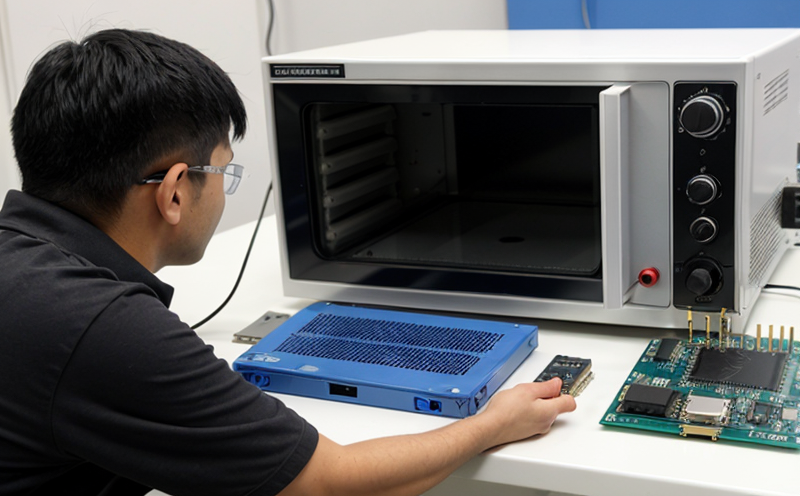Microelectronics & Components Testing
The field of microelectronics and components testing is crucial in ensuring that electronic devices meet stringent quality and performance standards. This sector encompasses a wide range of tests designed to evaluate the reliability, durability, and functionality of semiconductors, integrated circuits (ICs), passive components like resistors and capacitors, as well as active components such as transistors.
Our laboratory specializes in testing microelectronics and components according to international standards such as ISO 9001 for quality management systems. We employ state-of-the-art equipment capable of simulating real-world conditions that these devices might encounter during their lifecycle. This includes environmental stress tests, high-temperature storage tests (HTS), thermal cycling tests (TCT), and accelerated aging tests.
Our testing processes are designed to identify potential weaknesses or failures in microelectronic components before they reach the market. By understanding the specific requirements of each component type—whether it’s a surface mount device (SMD) or through-hole technology—we can tailor our testing methods accordingly. This ensures that every test performed aligns with best practices outlined by organizations like IEEE and JEDEC.
The success of any electronic product depends heavily on its ability to withstand various operational environments. Our laboratory uses advanced thermal chambers capable of maintaining temperatures from -40°C up to 150°C, humidity rooms that can simulate relative humidity levels ranging between 20% and 98%, and vibration test machines designed to replicate transport conditions.
For quality managers and compliance officers overseeing the development cycle of electronic products, our laboratory offers comprehensive testing services aimed at ensuring regulatory compliance with standards set forth by bodies such as FCC, CE, and UL. These tests help ensure that all aspects of design, manufacturing, and assembly are up to par.
R&D engineers benefit from our expertise in failure analysis, where we employ sophisticated microscopy techniques including SEM (Scanning Electron Microscopy) and EDX (Energy Dispersive X-ray Spectroscopy). This allows us to pinpoint the exact cause of any malfunction or defect within a component. Our detailed reports provide insights into not just what went wrong but why it happened under specific conditions.
For procurement teams, our testing services offer peace of mind knowing that every component they source meets rigorous quality standards before being integrated into larger systems. This reduces the risk of supply chain disruptions caused by substandard parts while also enhancing overall product reliability and longevity.
Applied Standards
In conducting microelectronics & components testing, we adhere strictly to international standards that govern various aspects of electronic device performance. These include ISO 9001 for quality management systems, ISO/IEC 17025 for laboratory requirements, and ASME (American Society of Mechanical Engineers) codes for pressure vessel inspections.
For specific components like semiconductors, we follow JEDEC standards which cover everything from packaging to electrical characteristics. In the case of integrated circuits, compliance with IEEE 1584 helps ensure safe handling during manufacturing processes. For passive components such as capacitors and resistors, military-grade testing per MIL-STD-202G ensures robustness against harsh environments.
Additionally, our lab adheres to environmental regulations like RoHS (Restriction of Hazardous Substances) Directive 2011/65/EU which mandates the use of non-toxic materials in electronics assembly. By ensuring strict adherence to these standards, we contribute towards sustainable manufacturing practices.
Our commitment to following best industry practices is further exemplified by our participation in ISO/TC 21/SC4/WG3 working groups where we collaborate with other experts from around the world to refine and update technical specifications for new products entering the market.
Customer Impact and Satisfaction
The impact of our microelectronics & components testing services extends far beyond just meeting regulatory requirements; it significantly enhances customer satisfaction by delivering reliable, high-performance electronic devices. Our detailed reports provide valuable feedback to manufacturers regarding areas needing improvement or optimization post-production.
By incorporating our recommendations early in the product lifecycle, companies can avoid costly recalls and reputational damage associated with faulty products reaching end users. This proactive approach not only improves brand reputation but also fosters long-term relationships based on trust and reliability.
Our testing services also play a crucial role in reducing warranty claims by identifying potential issues early during development stages rather than after mass production has begun. This saves both time and money for manufacturers who can address problems internally before external complaints arise.
In summary, our microelectronics & components testing offers more than just compliance with industry standards; it provides a comprehensive service that ensures high-quality products reaching the market are safe, reliable, and perform optimally under expected operating conditions.
Competitive Advantage and Market Impact
In today’s competitive market, maintaining a strong reputation for quality is essential. Our microelectronics & components testing services give companies the edge they need to stay ahead of competitors by ensuring that their products meet or exceed global standards.
By leveraging our expertise in advanced testing methodologies and adhering strictly to international norms such as ISO/IEC 17025, we help businesses navigate complex regulatory landscapes with confidence. This not only reduces compliance risks but also opens doors to new markets where stringent quality assurance measures are required.
Our detailed reports serve multiple purposes beyond mere certification compliance; they offer actionable insights that can be used by R&D teams to innovate and improve future generations of products. This forward-thinking approach ensures continued leadership in technological advancements within the electronics industry.
The demand for reliable electronic components continues to grow across various sectors including automotive, aerospace, consumer electronics, and healthcare. By providing consistent, high-quality testing services, we enable manufacturers to meet these demands while maintaining a strong foothold in their respective markets.





